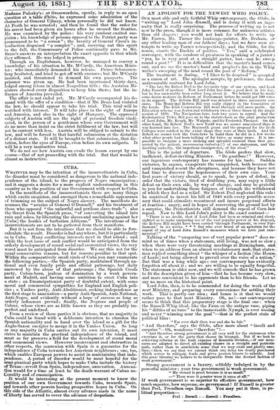CUBA.
Wrramv ea may be the intention of the insurrectionists in Cuba, the disorder must be considered as dangerous to the national inde- pendence of the island, to the progress of Negro emancipation ; and it suggests a desire for a more explicit understanding in this country as to the position of our Government with respect to Cuba.
In the manifesto of the insurrectionists there are many things which excite suspicion, and amongst them a remarkable appearance of trimming on the subject of Negro slavery. The manifesto de- nounces the "avarice of General O'Donnell," and his treatment of those who opposed "the unlawful and perilous slave-trade"-' also the threat from the Spanish press, " of converting the island into ruin and ashes, by liberating the ;laves and unchaining against her [Cuba] the hordes of barbarian Africans." The intentions of the insurrectionists are not to be gathered from their manifesto. But it is not from the intentions that we should be able to fore- calculate the result. Disorder is bad anywhere, but it is particularly so in Cuba. Many conflicting interests meet in that island ; and while the best issue of such conflict would be anticipated from the orderly development of sound social and economical views, the very worst must be anticipated from disorder. We say this nut for the usual conservative reasons, but for reasons pemiliar to that spot. Within the comparatively small circle of Cuba you may enumerate the following parties,—the Spanish party, maintained through na- tional and even family pride and official patronage, but daily narrowed by the abuse of that patronage ; the Spanish Creole party, Cuban-born, jealous of domination by a weak govern- ment at Madrid, and having some ambition to erect Cuba into a state ; an Emancipationist party of doubtful extent, with some moral and commercial sympathies for England and English poli- cies ; a Yankee party, Anti-Abolitionist, seeking independence as the first stage to annexation—a party Anti-Spanish, Anti-National, Anti-Negro, and evidently without a hope of success so long as orderly influences prevail ; finally, the Negroes and people of Colour, whose views are as little known as they are probably im- perfect and undefined.
From a review of these parties it is obvious, that no majority in Cuba could be found with a deliberate intention to abandon the Spanish nationality and to hand over the island as a gift for the Anglo-Saxon energies to merge it in the Yankee Union. So long as any majority in Cuba carries out its own intention, it must strive to maintain the practical independence of the island, and must so far preserve a field for the development of sound moral and economical views. However inconvenient and obstructive in other respects, the connexion with Spain is a guarantee for the independence of Cuba towards her American neighbours; one, too, which enables European powers to assist in maintaining: that inde- pendence. A period of disorder would he most hopeful for the semi-piratical party which 'hopes to make Cuba imitate the history' of Texas—revolt from Spain,-independence, annexation. Annexe- ton would for a time at least be the death-warrant of Cuban na- tionality and of emancipation. It would be interesting at the present moment to know the position of our own Government towards Cuba, towards Spain, and towards other powers having prospective hopes in Cuba. On this side of the Atlantic, almost every advance made in the name of liberty has served to cover the advance of despstisra


























 Previous page
Previous page